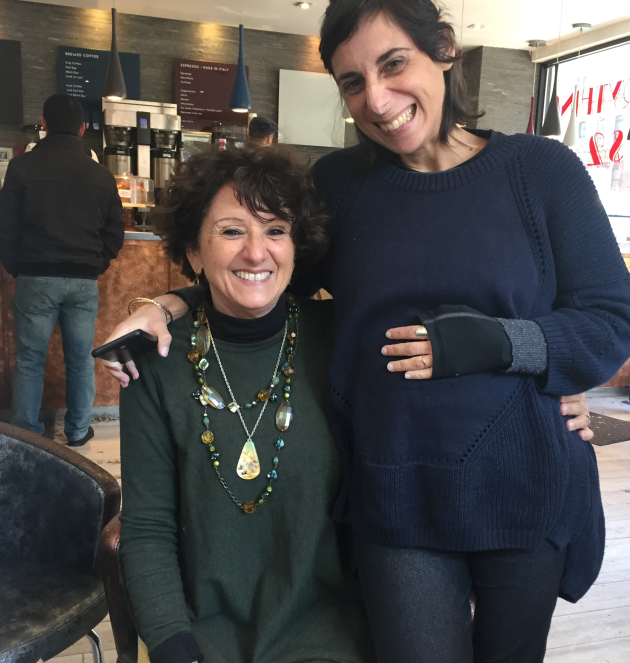
by Amy Stone
Women’s Narratives on Film Create Something Far from a Feel-Good Zionist Experience
The Other Israel Film Festival is not meant to be a feel good Zionist experience. In its 13th year at Manhattan’s Marlene Meyerson JCC, the eight days of films about minorities and women opened with “Advocate,” the documentary on crusading lawyer Lea Tsemel. After nearly 50 years, no longer a foul-mouthed babe in micro minis, Tsemel’s still defending Palestinian political prisoners. She sardonically jokes that she’s never won a case, but continues to play her advantages as a woman and a Jew. The festival closed with the even darker narrative “Screwdriver.” It’s the relentlessly hopeless tale of a West Bank man welcomed back as a hero by the media, his friends and family after years in an Israeli prison, taking the rap for an attempted murder. His loving family, opportunity for employment, and attractiveness to women can’t save him.
The mid-November festival was punctuated by Gaza rockets fired deep into Israel, Benny Gantz unable to form a cabinet, and the U.S. reversing its 40-year-policy, giving Israel the go-ahead on settlements in the West Bank.
In this environment, female filmmakers represent a spirit of persistence and the hope embodied by creativity itself. At its simplest, the short “Girl on a Bike,” the first film by young Palestinian Israeli Dekra Zohir Makalda, is the nine-minute hint of change in an Arab village. A teenager, head covered, just wants to ride her bicycle, circling her family-approved suitor almost as if she’s rounding him up. When he refuses to support her bike riding, she leaves him in the dust, saying, “Who do you think you are? My father?” She’s a new generation.
The four-minute “Arabic Friday,” directed by Gal Rosenbluth, zeroes in on the cultural dominance of Hebrew as the language of the Jewish State. A young Israeli couple – Jewish woman, Palestinian man – agree to speak only Arabic one day a week. Miscommunication and anger follow. Rosenbluth and her real life Palestinian boyfriend are developing a rom-com TV series about a couple much like themselves. Describing themselves via Skype as the “confused generation,” hopefully they’ll be mining the complexities of gender and race in Israel’s macho society where the woman is the second sex but as the Jew wields power.
Then there’s the triumph of determination. Emmanuelle Mayer, 39, spent 10 years filming “A Fish Tale,” the documentary of a couple from Ghana living in Israel. Johnny wants to bring the skills of Israel’s modern fish farming back to Africa. Thérèse, after more than a decade in Israel, has become an independent woman and sees no future for herself or her children back home. When Israel forces foreign workers to leave, crisis ensues.
A FISH TALE TRAILER eng from Emmanuela Mayer on Vimeo.
Interviewed in a Chelsea, Manhattan, café, Mayer said she began working on “zero budget, never knowing if anyone would see it, it was a story I had to tell,” even though “Israeli society is not so interested in hearing stories of black people.” In fact, the film won the Audience Award at this year’s Jerusalem Film Festival.
Mayer, whose family moved from France to Israel when she was three, is one of some dozen successful Israeli women cinematographers. Currently six months pregnant, she worked into her eighth month during her first pregnancy, shooting a TV series about female pilots. She “insisted on getting hired when pregnant. They just had to pay more insurance” to cover a pregnant cinematographer. Her initial connection to Johnny in “A Fish Tale” was teaching him how to use a video camera.

In New York, Emmanuelle Mayer, director of “A Fish Tale,” with her mother, Josiane Mayer, with baby in production inside.
Photo credit: Amy Stone
Film can start change. “A Fish Tale” changed the thinking of Carole Zabar, who created the OIFF and continues to fund it through the JCC’s Carole Zabar Center for Film, which is directed by Isaac Zablocki. After seeing “A Fish Tale,” she now feels foreign workers should be allowed into Israel even if, as non-Jews, they can never become Israeli citizens. “Israel letting in 50,000 foreign workers without a plan for them really made me ponder how to conceive of a solution.”
And what about the solution that eludes life for Palestinians? Would that Mira Awad’s new Israeli TV series “Muna” could be progress, not escapism. Definitely heartening: Awad, a Palestinian Israeli woman, has created her own TV series. She stars as one hot Palestinian Israeli photographer, involved with a Jewish boyfriend, taunting her apolitical Palestinian assistant. She’s in her Tel Aviv bubble until Israeli’s 2014 military operation in Gaza escalates.
Awad came to fame as Israel’s first Arab finalist in the Eurovision Song Contest then played a major role in the sitcom “Arab Labor.” She uses “Muna” to dig into subplots of abuse and conflict within families. And that’s just in the first two episodes screened at the OIFF. Early on, when Awad wanted to talk about her music, the media just wanted to tell the story of the Arab girl from the village emancipated in Tel Aviv. She realized, “If I didn’t take control of the narrative, they’d keep telling [their version of] my story.” Now 44, she’s using her TV series to tell “the story of coexistence, the importance of having diversity of narrative – women’s rights, children’s rights. It’s a tactic. It’s all storytelling tactics.” And women have long been the storytellers of the tribe.
Over the eight days of the festival, we kept seeing multiple generations of women using whatever tactics work to push for change. Cue the strong women in their 70s – Lea Tsemel and Carole Zabar. And younger women — Emmanuelle Mayer and Mira Awad. And, hopefully, much younger women – like the recent college graduate Dekra Zohir Makalda, the Palestinian Israeli making her first film.